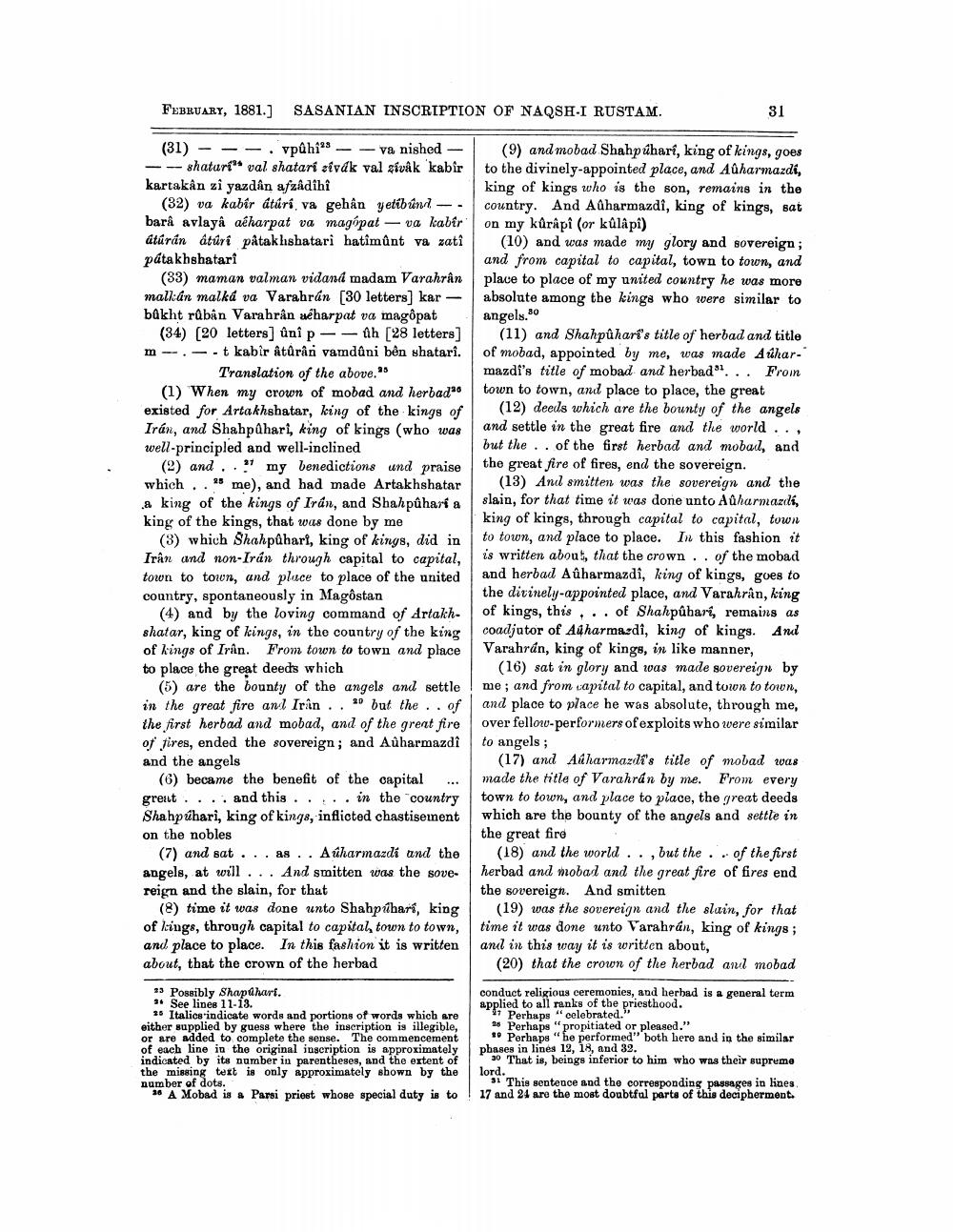________________
FEBRUARY, 1881.]
(31)
vpûhi23
- va nished shaturi val shatari zivák val zívak kabir kartakân zi yazdân afzâdîhî
(32) va kabîr átúrí, va gehân yetîbûnd — - barà avlayâ aéharpat va magpat va kabir átúrán átúri pâtakhshatari hatîmânt va zatî pátakhshatari
m
SASANIAN INSCRIPTION OF NAQSH-I RUSTAM.
(33) maman valman vidand madam Varahrân malkán malká va Varahrán [30 letters] kar - bakht rûbân Varahrân aéharpat va magôpat
(34) [20 letters] ûnî pûth [28 letters] - - t kabir âtûrân vamdûni bên shatarî. Translation of the above."
(1) When my crown of mobad and herbad existed for Artakhshatar, king of the kings of Irán, and Shahpahari, king of kings (who was well-principled and well-inclined
25
(2) and my benedictions und praise which.. me), and had made Artakhshatar a king of the kings of Irán, and Shahpûhari a king of the kings, that was done by me
(3) which Shahpûhari, king of kings, did in Iran and non-Irán through capital to capital, town to town, and place to place of the united country, spontaneously in Magôstan
(4) and by the loving command of Artakhshatar, king of kings, in the country of the king of kings of Iran. From town to town and place to place the great deeds which
(5) are the bounty of the angels and settle in the great fire and Irân.. 20 but the.. of the first herbad and mobad, and of the great fire of fires, ended the sovereign; and Aûharmazdî and the angels
(6) became the benefit of the capital great.... and this. . . . in the country Shahpuhari, king of kings, inflicted chastisement on the nobles
(7) and sat... as.. Aúharmazdi and the angels, at will. And smitten was the sovereign and the slain, for that
(8) time it was done unto Shahpuhari, king of kings, through capital to capital, town to town, and place to place. In this fashion it is written about, that the crown of the herbad
23 Possibly Shapahari.
2 See lines 11-13.
25 Italics indicate words and portions of words which are either supplied by guess where the inscription is illegible, or are added to complete the sense. The commencement of each line in the original inscription is approximately indicated by its number in parentheses, and the extent of the missing text is only approximately shown by the number of dots.
36 A Mobad is a Parsi priest whose special duty is to
31
(9) and mobad Shahpuhari, king of kings, goes to the divinely-appointed place, and Aûharmazdi, king of kings who is the son, remains in the country. And Aûharmazdi, king of kings, sat on my kûrâpî (or kûlâpî)
(10) and was made my glory and sovereign; and from capital to capital, town to town, and place to place of my united country he was more absolute among the kings who were similar to angels.30
(11) and Shahpûhart's title of herbad and title of mobad, appointed by me, was made Aúhar-" mazdi's title of mobad and herbad"... From town to town, and place to place, the great
(12) deeds which are the bounty of the angels and settle in the great fire and the world... but the of the first herbad and mobad, and the great fire of fires, end the sovereign.
(13) And smitten was the sovereign and the slain, for that time it was done unto Aûharmazdi, king of kings, through capital to capital, town to town, and place to place. In this fashion it is written about, that the crown.. of the mobad and herbad Aûharmazdi, king of kings, goes to the divinely-appointed place, and Varahran, king of kings, this... of Shahpûhari, remains as coadjutor of Aqharmazdi, king of kings. And Varahrán, king of kings, in like manner,
(16) sat in glory and was made sovereign by me; and from capital to capital, and town to town, and place to place he was absolute, through me, over fellow-performers of exploits who were similar to angels;
(17) and Adharmazdi's title of mobad was made the title of Varahran by me. From every town to town, and place to place, the great deeds which are the bounty of the angels and settle in the great fire
(18) and the world.., but the.. of the first herbad and mobad and the great fire of fires end the sovereign. And smitten
(19) was the sovereign and the slain, for that time it was done unto Varahrán, king of kings; and in this way it is written about,
(20) that the crown of the herbad and mobad
conduct religious ceremonies, and herbad is a general term applied to all ranks of the priesthood.
Perhaps "celebrated."
28 Perhaps "propitiated or pleased."
Perhaps "he performed" both here and in the similar phases in lines 12, 18, and 32.
30 That is, beings inferior to him who was their supreme lord.
31 This sentence and the corresponding passages in lines. 17 and 24 are the most doubtful parts of this decipherment.




